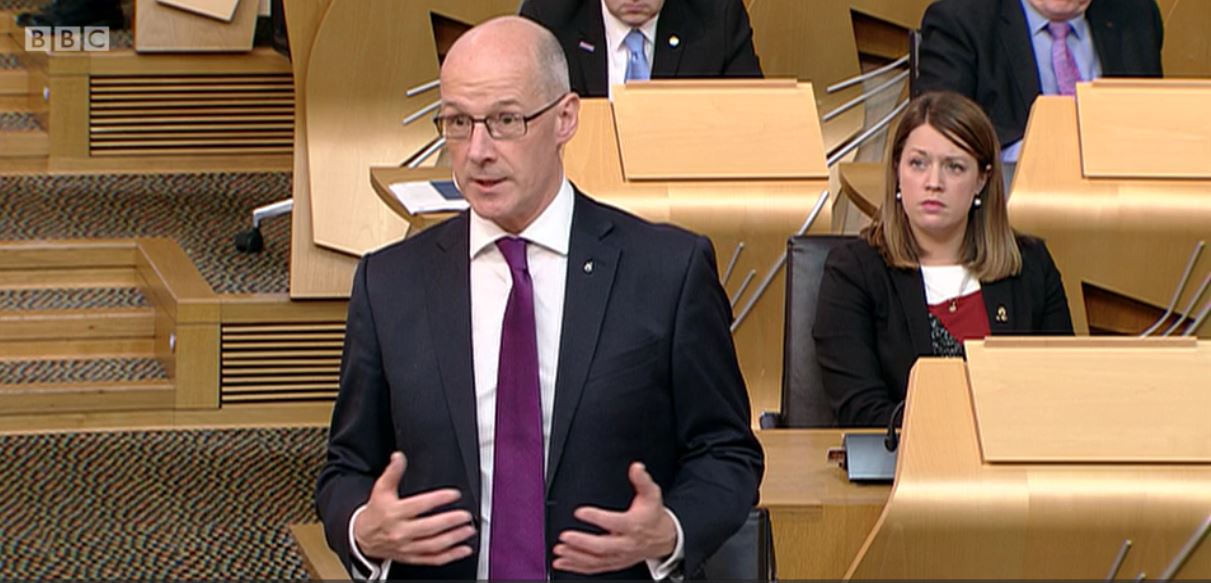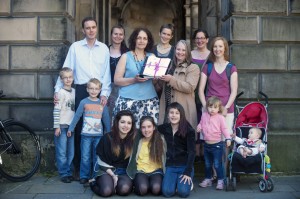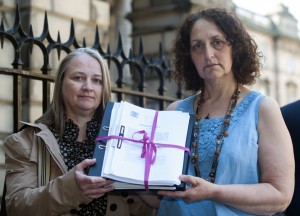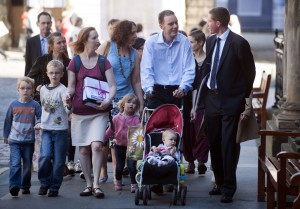Blog
Keeping you up to date on the progress of the Named Person scheme and the NO2NP campaign.
‘Unworkable’ Named Person Bill blocked by Holyrood committee
Posted 8 years agoHolyrood’s Education and Skills Committee has refused to back the Named Person information sharing Bill, in what may be the biggest setback to the scheme since it was declared unlawful by the UK Supreme Court last year.
Yesterday, the Committee told Deputy First Minister John Swinney that they cannot properly assess the Bill until they have an “authoritative draft” of the Code of Practice explaining how it will operate. Mr Swinney has previously said he is “not minded” to consult on the Code of Practice until the legislation has passed.
The Committee’s letter said that without the code “the majority of the Committee do not consider that they are able to make a decision on whether to recommend that the general principles of the bill be approved”.
In taking this action the Committee has rejected John Swinney’s attempt to railroad through the legislation without addressing the concerns of the UK Supreme Court.
Mr Swinney responded to the Committee’s decision by announcing he will form a new independent panel to try to persuade the public that the Named Person policy is ‘workable’.
NO2NP spokesman Simon Calvert commented: “This is further evidence of the terrible handling of this policy. The Committee has shown it will not have the wool pulled over its eyes and has bravely stood up to John Swinney.
“Initially he and the Scottish Government tried to steamroller through this deeply flawed and unworkable Bill without giving MSPs the chance to see the crucial details of how it would work in practice.
“Expert witnesses from the legal world and practitioners who will have to work with this scheme have all warned about the dangers and shortcomings of this Bill.
“The Committee has taken heed of that evidence – unlike the Government, which has ploughed on regardless. Now it is being forced to go back and think again.
“John Swinney cannot ignore this and must act on the Committee’s letter. He’s kept MSPs, parents and practitioners in the dark. It’s time he saw the light and consigned this appalling legislation to the Holyrood dustbin. It’s clearly not fit for purpose. MSPs know that. Parents and practitioners know that too. In fact everyone seems to know that except the Scottish Government.
“As things stand, the legal advice we have received is that the new Bill is vulnerable to more court action with good prospects of a victory for any challenge.”
In a parting shot, the Committee also addressed accusations that the Scottish Government had applied pressure to some of the witnesses who are before it to give evidence, demanding reassurances that the Government had not “sought to directly influence evidence to the Committee”.
‘Postcards from the Fringe’: Families give evidence about Named Persons
Posted 8 years agoGuest blog by Lesley Scott of Tymes Trust and Alison Preuss of Scottish Home Education Forum
Evidence from families affected by GIRFEC shows parents shun family services as they do not trust Named Person scheme
A ‘fringe’ event was held in Edinburgh on 15 November to hear families’ own testimonies on the Children and Young People (Information Sharing) (Scotland) Bill, which is currently before the Education and Skills Committee of the Scottish Parliament.
Although the Government has claimed the new Bill will remedy the defects of the Children and Young People (Scotland) Act 2014, those adversely affected by the GIRFEC policy and the premature implementation of the Named Person scheme were excluded from Holyrood’s invitation-only evidence sessions and focus groups. In order to redress the balance, Tymes Trust and the Scottish Home Education Forum issued their own call for evidence.
‘Postcards from the fringe’ allowed attendees-in-person to respond to questions that had arisen from over 90 pieces of evidence submitted, and to raise other points for discussion.
A delegation of parents and children later visited the Scottish Parliament to deliver their evidence (www.np-fringe.uk/the-evidence) to James Dornan MSP, convener of the Education and Skills Committee.
Desired outcomes from the fringe event
- Scrap the current bill. It cannot change the legal framework or consent threshold upheld by the Supreme Court.
- A public inquiry into how unfettered mass data misuse became embedded in policy and practice, as admitted on the record by ‘services’ acting on unlawful Government guidance.
- Access to justice for those who have had their rights infringed and are still suffering harassment.
- Removal of legal immunity for professionals who breach data protection law and act beyond their powers.
- Fully consent-based model for any ‘wellbeing’ data processing, from collection to deletion, with special protection from coercion for children in schools and ‘care’ settings.
- Recognition of parents as experts on their own children.
- Urgent review of information governance and data security.
Reflections from the fringe
Participants were asked whether they believed the new Bill would satisfy the terms of last year’s Supreme Court ruling, which struck down key provisions of the 2014 Act, and how they thought the Government and Parliament should proceed in the face of continuing opposition to its proposed legislation and an overarching policy framework which places state outcomes above citizens’ autonomy.
Much discussion focused on the data sharing and undefined, subjective notion of ‘wellbeing’ on which the Named Person scheme and wider GIRFEC policy rely, and inconsistent messaging (support or mass surveillance?). Families noted their irrevocable loss of trust in public/third sector providers, which has already resulted in avoidance of services, refusal to disclose information that may be misused or lost, covert recording of all engagements with professionals, opt-out from health visiting, nurseries and, increasingly, schools.
Other recurrent themes were the lack of access to justice for those whose human rights had been, and continue to be, infringed by public and third sector bodies, and the lack of accountability of those who failed to get it right in the face of case law and legal opinion that had predicted the outcome of the judicial review.
Families believed their own evidence and experiences had been filtered out in order to push through legislation and a code of practice whose only purpose is to seek circumvention of the Supreme Court ruling.
Many people were of course unable to attend the daytime event on 15 November. The event was held during the day so that we could hand deliver the evidence ‘postcards’ to the Parliament, but we had planned to live-stream the event for those unable to attend. With this in mind we had initially booked the Quaker Meeting House, 7 Victoria Terrace Edinburgh which was “well equipped with audio-visual equipment and […] Wi-Fi.” Unfortunately the Quaker Meeting House cancelled our booking out of the blue. The Quaker Meeting House has hosted National Third Sector GIRFEC Project as well as other GIRFEC supporting events.
This spanner in the works forced us to find an alternative venue at short notice – not an easy task in the middle of Edinburgh a month before Christmas. Unfortunately the broadband provision in the venue we finally secured was not what we had expected and did not support live-streaming of the event. What is more the acoustics have rendered the recording sub-standard. We are endeavouring to save what we can of the day’s discussions and may post the salvaged footage if we can.
We thank you for your patience.
Evidence is stacking up against the Named Person scheme
Posted 8 years agoYesterday Holyrood’s Education and Skills Committee had its sixth evidence session on the Named Person information sharing Bill.
And it’s not looking good for the Scottish Government.
The proposals have not only been criticised by lawyers, health professionals, teachers and data-sharing experts, but even MSPs have had enough.
MSPs on the Delegated Powers and Law Reform Committee were not satisfied with the answers they got from John Swinney in September. The committee has now recommended that the Scottish Government “revisits its approach to the Code of Practice”, which is central to Named Person practice on the ground.
NO2NP spokesman Simon Calvert commented: “This is a real rebuke for John Swinney. Hidden beneath the bland wording of a Parliamentary press release is the anger of a committee of MSPs denied the opportunity to exercise their constitutional and democratic duty … on behalf of the families of the country they represent.”
Maggie Mellon, giving evidence on behalf of the NO2NP campaign yesterday, told the Education and Skills Committee: “The problem we need to address is: is this about parents or telling people what’s good for them and acting in a way we all think is good for them, rather than listening to what they want?”
She raised concern that there was still a lack of definition for “wellbeing” and commented: “Asking for compulsory intervention on basis of subjective indicators and requiring professionals to interfere is not helpful”.
She asserted: “Are we going to get it right this time?”
Last week DCI Norman Conway, representing Police Scotland, appeared to admit to the Education and Skills Committee that the police had been involved in years of unlawful data sharing. He blamed the ICO guidance from 2013 and said, “we started to believe we were in good grounds to actually actively share wellbeing information regarding children”.
DCI Conway told MSPs: “And actually what’s happened following the Supreme Court judgment is that we have really tightened up in terms of individual rights, we’ve really tightened up in terms of the information that’s being shared”.
Commenting on the news, NO2NP spokesman Simon Calvert said: “It’s now been publicly confirmed for the first time that for three years the police – and possibly other organisations who relied on the ICO advice – were routinely disclosing the private and confidential information of children and families in an outrageous invasion of privacy and human rights.
“This was all happening before the scheme was fully implemented. Imagine what would have awaited families if the Supreme Court had not come to their defence?”
The evidence is stacking up against the Named Person scheme. When will the Scottish Government will admit it got it wrong for Scottish families and drop these intrusive plans?
NO2NP responds to Swinney statement on Named Persons
Posted 9 years agoThe Deputy First Minister has claimed the Supreme Court defeat “does not require current policy to change” and that it “vindicated” the Parliament vote for the Named Person legislation.

John Swinney made the remarks during a statement on Named Persons to the Scottish Parliament today.
Reacting to the statement, NO2NP spokesman Simon Calvert said:
“This would be laughable if it were not so offensive to the parents whose human rights were so cavalierly ignored in the drafting of the Named Person law.
“The Supreme Court said the kind of widespread, routine sharing of sensitive personal data that the Government wanted is unlawful and a breach of human rights and cannot go ahead. It said this data sharing was ‘central’ to the Named Person policy and its ruling blew it out of the water.
“So whatever the Deputy First Minister may claim, the Named Person scheme he ends up with in a year’s time will be very different from the policy he wanted.
“Instead of focusing on saving face, the Government should be apologising to parents for ignoring their human rights.
“We welcome the Deputy First Minister’s pledge to consult widely with professionals and parents, including people who do not agree with the Named Person.
“The consultation, and the acknowledgement that it will take a year to draw up and implement the new proposals, is an admission that they have to heavily rewrite key aspects of the Named Person policy.
“The ‘business as usual’ message which the Scottish Government had been sending out since the Named Person ruling was in danger of leading local authorities to carry on with unlawful sharing of private information on families.
“Having spent years encouraging the widespread illegal sharing of sensitive personal data, they should now be doing everything they can to put a stop to it.
“Parents who feared that Named Persons were sharing embarrassing personal information behind their backs have been frightened by the Government’s bluster about barrelling on with the Named Person.
“Today, Mr Swinney has made clear that data-sharing needs to comply with the Data Protection Act and the Human Rights Act. That is welcome.
“Will his Government now also launch an inquiry to discover what illegal data-sharing has already taken place, and announce what they are doing to stamp it out?”
Full statement on Named Person – Deputy First Minister, 8th September 2016
FIRST MINISTER REITERATES CLAIM ‘NAMED PERSON SCHEME NOT OBLIGATORY’
Posted 9 years agoFirst Minister Nicola Sturgeon reiterated her claim that the Named Person scheme is an ‘entitlement’ and ‘not an obligation’ when questioned in Holyrood today.
WATCH: First Minister reiterates ‘no obligation’ claims during FMQs
Speaking during First Minister’s Questions, she said: “Well as I have said and I’ll say again today, the Named Person scheme is an entitlement. I think it is a good and sensible entitlement. It is not an obligation. It helps children and families get the support they need from services, when they need it.”
She stated: “It does not in any way, shape or form replace or change the role of the parent or carer or undermine families.”
But just earlier this week her own Government published a response to a UN committee stating that “every child in Scotland will have a Named Person who will receive training in identifying, assessing and responding to their needs”.
And the Named Person legislation not only neglects to mention parental opt-out, but also completely misses the entire concept of parental consent.
Her own Government’s QC, Alistair Clarke, said during the Named Person legal challenge at the Court of Session that to allow an opt-out would “defeat the purpose of the scheme”.
The First Minister, responding to questions from Ruth Davidson MSP, leader of the Conservatives, told the chamber today: “The fact of the matter is that the children and parents are not legally obliged to use the Named Person service, or take up any of the advice or help that is offered to them”.
She added that, “parents are not legally obliged to use it because it is an entitlement not an obligation. I think that’s sensible, making sure it is there for everybody when they do need it, if they do need it, but not obliging anybody to use it if they feel they don’t need it.”
The First Minister was accused of sending “mixed messages” during an interview with BBC Scotland’s Political Editor Brian Taylor last week, when she said that the Named Person scheme was “not mandatory”.
VIDEO: NICOLA STURGEON ON THE DEFENSIVE OVER DATA SHARING
Posted 10 years agoIn Holyrood yesterday, Nicola Sturgeon was pressed by Liz Smith MSP over the compatibility of the Named Person scheme with a child’s right to privacy.
Smith was highlighting concerns raised by Community Law Advice Network (Clan Childlaw), who recently explained that the plans could result in children having no expectation of privacy, which could lead to them shunning helplines and advisory services.
Currently information can be shared without a child’s consent if there is a “risk of significant harm” to a child.
But under the Named Person scheme information can be shared if there is simply concern for a child’s “wellbeing” – a phrase so broad that it now embraces terms such as happiness, quality of life, economic status, health, educational achievement and levels of respect for the child and others.
When asked to respond to concerns raised by Clan Childlaw, Sturgeon said: “Information sharing should always be appropriate, and it should always be proportionate to concerns about wellbeing”.
VIDEO: Nicola Sturgeon pressed at First Minister’s Questions to u-turn on Named Person
Posted 10 years agoIn Holyrood yesterday, Nicola Sturgeon was pressed by Ruth Davidson MSP to do a u-turn on implementing the controversial Named Person scheme.
Davidson, the leader of the Scottish Conservative Party, said: “This First Minister has already delivered a u-turn on her predecessor’s plans on corporation tax, she has U-turned on a new women’s super prison, she’s now done the right thing and U-turned on corroboration.
“Families are asking her on named person: will she do the right thing and U-turn on this too?”
But Sturgeon responded: “On named person, Ruth Davidson cannot go on describing things that are democratically passed by a majority of this parliament, just because she doesn’t agree with them, as somehow against the democratic wishes of the country.”
NAMED PERSON LEGAL CHALLENGE LAUNCHED
Posted 11 years agoThe legal challenge to stop the Scottish Government appointing a ‘state guardian’ for every child in the country up to the age of 18 was launched today.
Legal papers formally challenging Holyrood’s controversial Named Person plans were lodged at Edinburgh’s Court of Session this morning.
There was widespread interest as national news networks such as the BBC, STV, The Scotsman and The Herald, plus a host of other local networks, gathered outside the court to watch the crowd of concerned parents and other groups hand in the documents.
NO2NP is backing the legal action which asserts that the Scottish Government is acting illegally and exceeding its powers by setting up the Named Person scheme.
The campaign has a wide range of supporters, including academics, medical experts, social services professionals and many concerned parents.
Critics of the scheme, which is contained within the Children and Young People (Scotland) Act, say it contravenes the European Convention on Human Rights.
Colin Hart, Director of The Christian Institute, which is one of the petitioners in the case, said: “This marks the beginning of a landmark case which has implications for every family in Scotland. We are making a stand for all mums and dads who are doing their best for the children they love.
“We are not prepared to stand by and watch as the roles of parents and their rights to a family life are diminished and trampled over by an authoritarian big brother government intent on making its presence felt in every living room in the land.”
NO2NP will be staging a series of public meetings across Scotland as support for the campaign spreads. Events will take place in Glasgow, Dundee, Stirling and Inverness, with more expected.
The court case is being funded by more than 70 different sources. The court papers were lodged by The Christian Institute, the Christian charity CARE (Christian Action Research and Education), The Young ME Sufferers (Tymes) Trust, and the Family Education Trust.
They have been joined in the case by parents James and Rhianwen McIntosh from Bonnybridge and Deborah Thomas from Comrie.
BBC Sunday Politics Scotland: Named Person debate
Posted 11 years agoThe Named Person issue was debated extensively on BBC Sunday Politics Scotland over the weekend, with presenter Gordon Brewer putting pressure on the Minister for Children and Young People, Aileen Campbell, to explain the need for this intrusive proposal.
Watch the clip
The Director of The Christian Institute, which is part of the NO2NP campaign, also took part in the discussion saying the Named Person scheme would make it much more difficult to target resources at vulnerable children.
Other guests on the show included Gavin Brown, a Conservative MSP, opposed to the legislation.
Lesley Scott, who represents a charity providing support services for families with children suffering from ME and whose own son suffers from ME, was also interviewed on the show about her concerns over the Named Person scheme. You can watch an interview she did with NO2NP here.
Colin Hart, Director of The Christian Institute, which is preparing to mount a Judicial Review, said: “The Scottish Government has passed a Bill which gives huge powers to Named Persons to advise and talk to children without their parents even knowing about it and without their consent. And it seems to me a sledge hammer to crack a nut.”
“The same state bodies will be involved in looking for all these families where there’s no issue at all, so instead of actually finding that needle in the haystack they are actually making that haystack much bigger. And that’s going to make it much more difficult to find the vulnerable children”.
Round Up of Media Coverage of Named Person Plans
Posted 11 years agoThe Named Person plans have been widely criticised by politicians, parents, academics, journalists, faith groups and those working in education. Here is a media round up showing the strong opposition to this proposal.
Scottish children don’t need these government spies
The Guardian
Guardian angels … or Big Brother?
Herald Scotland
Warning over spiralling cost of state guardian scheme
Scottish Daily Express
State spies already snoop on thousands of families
Scottish Sunday Express
Guardian bill set to face legal hurdles
The Press and Journal
Fresh opposition to child guardians plan
Herald Scotland
Conservatives warn over child state guardian plans
The Scotsman
‘Named person’ is not needed
Herald Scotland
‘Named person’ plan faces legal challenge – Tories
The Scotsman
Euan McColm: Stop meddling with parents’ children
The Scotsman
Concerns raised over named person for Scots children plan
BBC News
Scottish ministers threatened with legal action over ‘state guardian’ plans
The Daily Telegraph
‘Named guardian’ plan for every child in Scotland set to go ahead
STV News
Lawyers slam ‘insidious’ plans to give every child a named person
STV News
SNP bill to spy on parents is criticised by families
Scottish Daily Express
Challenge to child protection bill
The Press and Journal
Parties launch final bid to stop SNP imposing a snooper on every family
Scottish Daily Mail
Poll shows only 20pc back child guardians (1 of 2)
Poll shows only 20pc back child guardians (2 of 2)
Scottish Daily Mail









